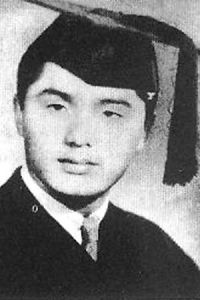Rong Yiren
| Rong Yiren | |
|---|---|
| 荣毅仁 | |

Rong Yiren in 1937
|
|
| 5th Vice President of the People's Republic of China | |
|
In office March 12, 1993 – March 15, 1998 |
|
| President | Jiang Zemin |
| Preceded by | Wang Zhen |
| Succeeded by | Hu Jintao |
| Personal details | |
| Born |
May 1, 1916 Wuxi, Jiangsu, China |
| Died | October 26, 2005 (aged 89) Beijing, China |
| Political party | Communist Party of China |
| Spouse(s) | Yang Jianqing (m. 1936–2005) |
| Alma mater | St. John's University, Shanghai |
| Rong Yiren | |||||||||
| Traditional Chinese | |||||||||
|---|---|---|---|---|---|---|---|---|---|
| Simplified Chinese | |||||||||
|
|||||||||
| Transcriptions | |
|---|---|
| Standard Mandarin | |
| Hanyu Pinyin | Róng Yìrén |
| Wade–Giles | Jung I-jen |
Rong Yiren (Chinese: 荣毅仁; Wade–Giles: Jung I-jen; May 1, 1916 – October 26, 2005) was the Vice President of the People's Republic of China from 1993 to 1998 and was heavily involved with the opening of the Chinese economy to western investment. Rong is known both in China and in the Western world as "the Red Capitalist" because his family were some of the few pre-1949 industrialists to have been treated well by the Communist party of China in return for their co-operation with the government of the People's Republic of China.
Rong was born on May 1, 1916 in Wuxi, a city near Shanghai in Jiangsu Province. His father Rong Desheng and uncle Rong Zongjing were the founders and operators of a flour and cotton milling business. He was educated at the Christian-run St. John's University, one of China's most prestigious colleges at the time. After graduation, Rong was assigned to manage a part of the family business and he took over the running of all 24 mills upon the death of his elder brother Paul Yung in an air crash on Basalt Island, Hong Kong, on 21 December 1948.
At the end of the Chinese Civil War and the founding of the People's Republic of China, Rong chose to stay on the Chinese mainland instead of fleeing to Hong Kong or Taiwan as most businessmen did. His family was allowed to keep their business until 1956, when all private businesses became state-owned. His family was given $6 million in compensation. He was appointed the vice-mayor of Shanghai in 1957 and later served as an economics adviser for the Communist Party of China.
...
Wikipedia
